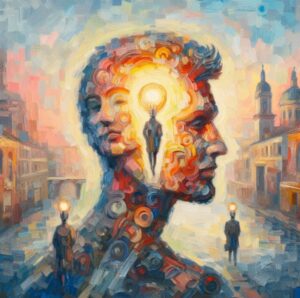
Toastmasters International encourages its members to maintain substantial original content in their speeches. I often wonder what can be called “original”. It is difficult to point out what falls under the scope of originality and what doesn’t. The more I think about it, the more I get confused.
The German poet and philosopher Johann Wolfgang von Goethe mentions that originality is essentially a matter of reassembling elements drawn from other sources.
It makes us question how to create something original from what we have observed in the past. An easy answer provided to us is to use imagination to spice up our observation. James Joyce succinctly described it when he said, “Imagination is memory.” This again brings us back to where we started.
Arthur Schopenhauer, popularly dubbed as an artist’s philosopher, argued that for one thing to be different from another, the idea of differentiation only makes sense if they occur at different spaces or times or both. If two identical things occur in the same space and time, they are essentially the same thing. Taking this argument to the next stage, he goes on to say that all knowledge must be of dual form i.e., subject and object, observer and observed, knower and known. We always have something that has been grasped and some we are grasping.
This differentiation helps us understand why our experiences are unique even if they seem relatable to someone else. We are all in different stages of the same experience. It is this subconscious understanding that creates imagination. This imagination becomes a great tool for our expression. Whether we express it through speaking, writing (prose or poetry), or other art forms.
It is this expression that creates our style. A style that is uniquely distinctive at first sight. At times, we will be told that “that is not how we do it”. Toastmasters is not quite different from the real world. Although at Toastmasters we highly encourage originality, sometimes we get evaluations that make us doubt ourselves.
Don’t worry! It is part of our evolution. It takes time to understand that evaluations are personal opinions. We need to understand which part of the evaluation will add value to our style. It is only when we upgrade our style through this value addition, that we identify our originality. There is a particular way we speak, we have a particular body language, that sets a standard for the evaluator to evaluate us. This standard becomes our identified originality.
It is worth noting that although style helps us create original speeches, the sustained process of polishing the style gives us recognition as original speakers.
When we are about to speak, the audience should intently wait to listen to what is coming. The audience should find a fresh perspective that is unmistakably original. Even in this age of the internet, when the audience listens to the recording of our speech repeatedly, they should find it original every time.
Coming back to our original discussion, originality is something difficult to describe in words. Like an emotion, originality is the amalgamation of the understanding of various memories of the observations that we have made in our lives.
It is an energy that can be transported from the speaker’s mind to the audience’s mind. The speakers would ideally like the audience to feel the same form of energy that they transported. More often than not, the audience receives the energy in a different form. A form that they are comfortable with.
Just enjoy this process of developing your originality without being concerned about how it will be received. Before you realize it, you will already be seen as original.
Written by TM Pramathesh Borkotoky,
Intercontinental Advanced Toastmasters Club, District 101